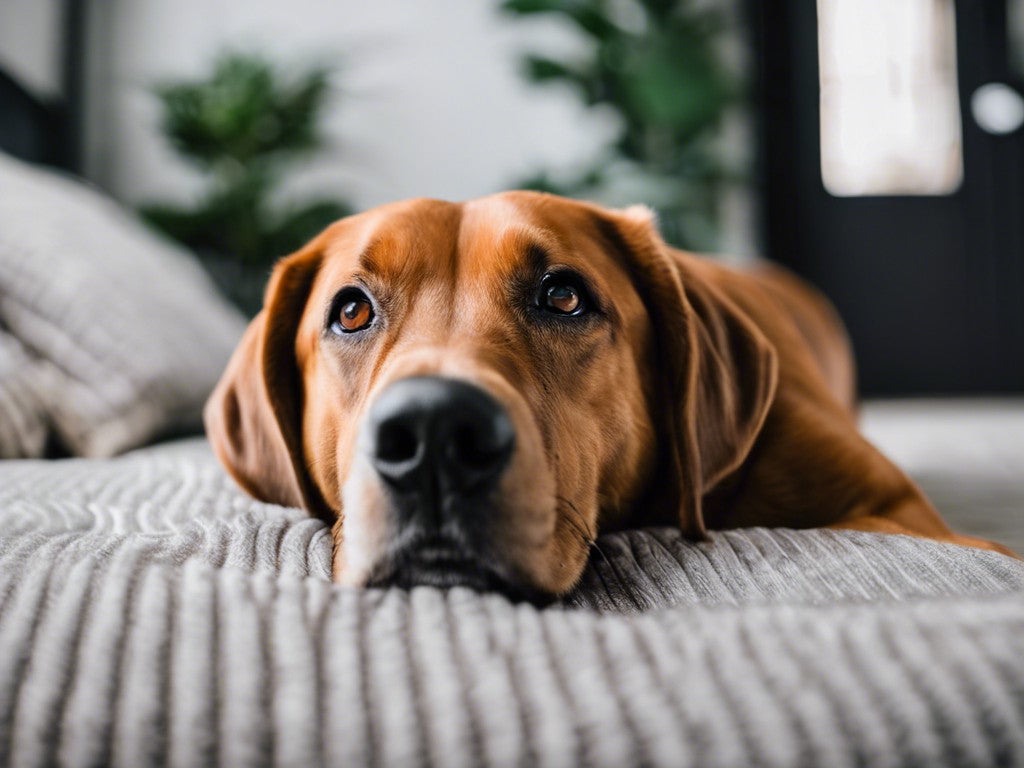

· By Brendan Monahan
How To Stop Dog Anxiety Whining
Dogs can experience apprehension just like humans do. An uneasy dog may whine excessively as a way to express their stress. While some whining is normal, excessive whining due to dread or uncertainty is disruptive and stressful for both you and your dog. By understanding the causes of whining and utilizing proven techniques, you can help your anxious furry friend feel more comfortable. Using natural supplements like Brave Paws can also help reduce your dog's uneasiness.
What Causes Apprehensive Whining in Dogs?
There are several potential triggers for anxiety whining in dogs:
- Separation - Dogs are pack animals and can become very distressed when left alone. Whining is their way of expressing sadness and stress when you leave.
- Fear - Loud noises, strangers, or unfamiliar environments can provoke fear and subsequent anxious whining. Thunderstorms are a very common noise phobia.
- Boredom - Under-exercised dogs may whine constantly due to pent up energy and boredom. Lack of mental stimulation can also cause boredom whining.
- Medical Conditions - Illness, injuries or age-related cognitive decline can cause confusion, discomfort and anxiety whining. Always rule out medical causes.
- Lack of Training - Dogs who aren't properly house-trained may whine when needing to go outside. Poor obedience training can also lead to separation anxiety.
- Changes in Routine - Dogs thrive on consistency and changes to their normal routine can elicit stress responses like whining.
How to Ease Your Dog's Whining
While apprehensive whining can be frustrating, there are effective techniques to help minimize this behavior in your dog:
- Identify the Trigger - Pay attention to when the whining occurs so you can identify the exact trigger. Keeping a journal can help uncover patterns.
- Exercise - Ensure your dog gets adequate physical and mental stimulation each day through walks, play time, and enrichment toys. A tired dog is less likely to whine from boredom or pent-up energy.
- Obedience Training - Work on "sit", "stay" and "quiet" commands using positive reinforcement training methods. This establishes you as the pack leader.
- Create a Calm Environment - Use pheromone sprays and diffusers, calming music, or wraps to help soothe your anxious dog in stressful situations.
- Counterconditioning - Slowly acclimate your dog to triggers like being alone by associating the trigger with something positive, like a treat.
- Provide Distractions - Give your dog a food puzzle toy stuffed with treats when you leave to redirect them from separation anxiety. Kongs® work great!
- Consult Your Vet - Rule out potential medical reasons for new onset whining. Your vet can also prescribe anxiety medications if needed.
- Consider Supplements - Natural calming supplements like Brave Paws can help reduce anxiety without sedating side effects.
How Brave Paws Calms Anxious Dogs
Brave Paws chewable tablets are an all-natural supplement clinically shown to reduce stress and unease in dogs. The active ingredients include:
- Souroubea - A rainforest vine used in traditional medicine to promote calmness. It's been shown in clinical studies to moderate cortisol levels in dogs.
- Sycamore Bark - Contains plant compounds that clinical studies show have anxiolytic effects.
Together these ingredients work synergistically to ease anxiety and it’s associated whining without sedating your dog. Brave Paws is simply administered twice daily, works fast, and has no negative side effects.
Brave Paws was tested in a placebo-controlled thunderstorm noise anxiety study on dogs. The dogs given Brave Paws demonstrated significantly less anxiety and more normal activity levels compared to dogs given a placebo. Their stress hormone cortisol was also lower.
The natural ingredients in Brave Paws are sustainably sourced and the supplement contains no CBD, THC, soy, corn, or grain. It has a tasty beef flavor dogs love.
With over 60 5-star reviews, pet parents are raving about the calming effects of Brave Paws for separation anxiety, thunderstorm phobia, and more. It's an easy and safe way to help your anxious whiner feel more relaxed.
Quelling Your Dog's Uneasiness and Stress Whining
Listening to constant whining from your anxious dog is stressful for both of you. With some detective work to uncover the triggers, consistent training, environmental management and Brave Paws supplements, you can help minimize anxiety and the resulting vocalizations. Always rule out medical causes first, and then implement a multifaceted approach to reduce stressors and teach coping skills. With time and patience, your furry friend will feel more secure and whine less.

